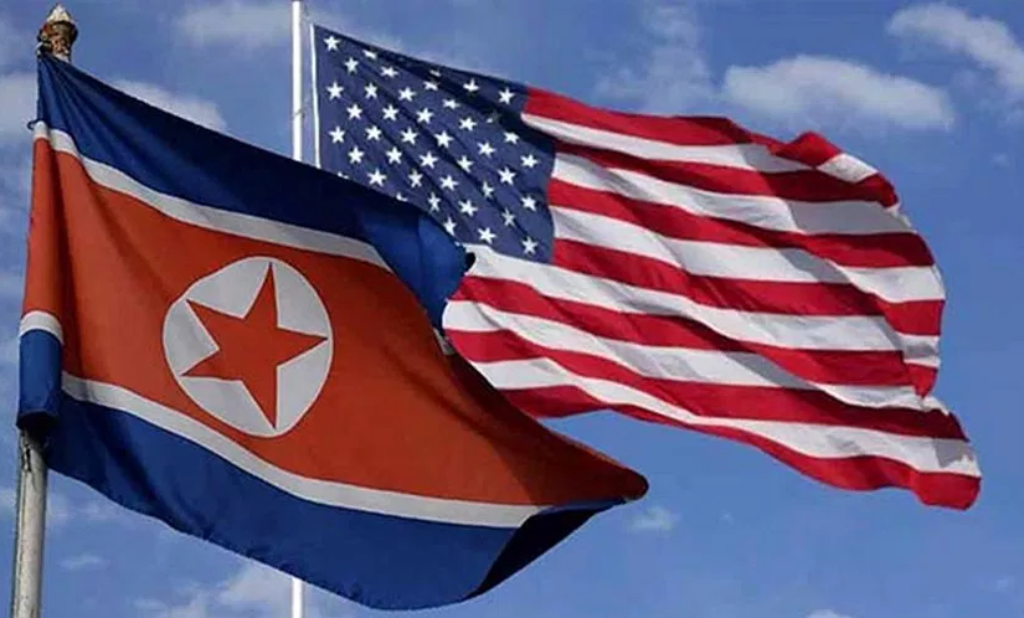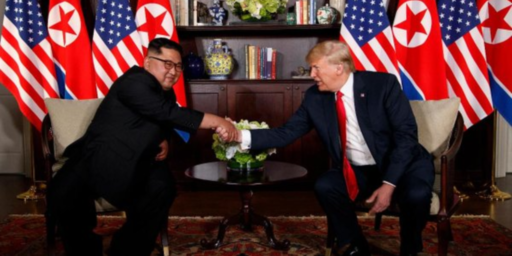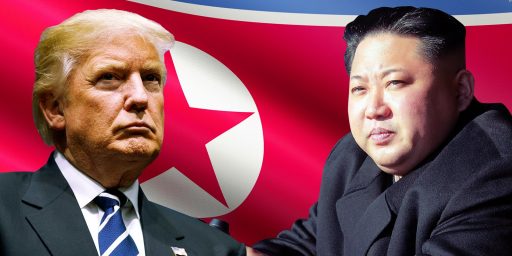Trump’s Brain Dead North Korea Policy
With the clock ticking down to the end of the year and a deadline imposed by the DPRK on talks with the U.S., the Trump Administration's North Korea policy is in a shambles.

Writing for The New York Times, Choe Sang-Hun notes that analysts believe that President Trump’s time is running out when it comes to reaching any kind of a deal with North Korea:
SEOUL, South Korea — The clock is ticking.
Kim Jong-un, North Korea’s leader, has said that the United States has until the end of the year to make a new proposal to create a breakthrough in stalled negotiations on denuclearizing the Korean Peninsula.
The looming deadline — which North Korea has issued repeated warnings about — carries the implicit threat that the country could return to its alarming behavior of the past by ending its self-imposed moratorium on nuclear tests and launching long-range missiles capable of hitting American cities. On Thursday, it launched two short-range rockets, its 13th rocket or missile test since May.
“Today, we sit on top of a live volcano,” said Robert L. Carlin, a former nuclear negotiator at the State Department and longtime North Korea observer, describing a rapidly deteriorating situation on the peninsula during a lecture this month at Yonsei University in Seoul, the South Korean capital. “We don’t have a lot of time to back away.”
In the past month, North Korea has warned that the Trump administration should not even “dream of” discussing denuclearization without first ending its “hostile” policies, including smothering economic sanctions. It swore “shocking punishment” if Washington were to ignore the year-end deadline.
Senior American diplomats do not appear to share that urgency. To them, it’s just posturing.
“I don’t remember a time limit being set. Is this the North Koreans?” David R. Stilwell, assistant secretary of state for East Asian and Pacific affairs, told reporters in Tokyo last month, admitting to being unaware of the deadline. “But I would say that the North Koreans do one thing a lot, and that’s bluff.”
When Washington has addressed the January deadline, it has called it an “artificial” time limit. And that leaves analysts fearing the outbreak of another crisis on the Korean Peninsula.
North Korea has not been explicit about what might happen after Dec. 31, except that Mr. Kim has warned of finding a “new way” if Washington persists with sanctions and tries to force an unpalatable denuclearization deal.
The seemingly negative turn in rhetoric from the North Koreans caomes after what had been a relatively quiet summer on the North Korean front. While it cannot be said that the ongoing talks between Washington and Pyongyang were producing anything positive, there also wasn’t any sign of the negative turn that seems to have ignited the change in rhetoric from the DPRK. This is the case notwithstanding the fact that earlier this year, there were warnings from Pyongyang that there would not be progress in talks between the two countries if the United States continued to insist on unrealistic goals such as its insistence on a commitment to denuclearization without any prior American agreement on sanctions relief. As the summer wore down, though, North Korea began warning the United States that made specific reference to those goals and stated that time was running out for the resumption of negotiation. It was several weeks later that the DPRK gave the United States until the end of the year to make progress in the talks. That deadline is now less than a month away, the talks are on hold with no sign they’re going to be revived and we have what appears to be a final deadline of the end of the year.
As Daniel Larison notes, responsibility for the lack of progress in negotiations clearly lies with Trump Administration and its insistence on a “maximum pressure” strategy that has never work with respect to the DPRK:
Trump’s actual North Korea policy remains maddeningly conventional in both its ends and means. The fixation on disarming North Korea has been a horrible mistake from the start, and the failure of two summits has not alerted anyone in the administration to the folly of demanding something North Korea will never give. The Trump administration clings to an unfounded belief in the efficacy of sanctions to deliver the desired results, so of course North Korea has lost patience with a process that promises to get them nothing.
Despite having a reputation for indulging Kim with his embarrassing love letter rhetoric, Trump shows no flexibility on providing sanctions relief because he wrongly assumes that pressure tactics can force adversaries to capitulate. He feigns accommodation at the same time that he makes unreasonable, maximalist demands. As Van Jackson has explained several times in the past, North Korea responds to pressure with pressure. “Maximum pressure” has never been the way to get North Korea to compromise. Because Trump insists on looking “tough,” he refuses to offer any real concessions that might prompt North Korean cooperation. The only tools he wants to use are threats and punishments, and that is why he cannot seize a genuine diplomatic opportunity when it stares him in the face.
The current hang up between the two nations appears to be over the American insistence that the ultimate goal of negotiations is the elimination of the DPRK’s existing nuclear arsenal, something that Pyongyang clearly isn’t going to do. The North Koreans, meanwhile, are insisting that it won’t make any further concessions unless the United States agreed to lift at least some of its sanctions. In the meantime, North Korea has seemingly become more belligerent, launching a series of short-range missile tests that President Trump has largely dismissed despite the obvious threat they pose to South Korea and Japan. All of this is happening, of course, because the Trump Administration continues to base negotiations on a faulty understanding of what North Korea agreed to in previous meetings and what it is likely to agree to in the future.
Immediately after his first meeting with Kim Jong Un in Singapore, for example, President Trump claimed that there was no longer a nuclear threat from the DPRK because of what happened at the meeting. The evidence since that time, though, it has been clear both that Kim Jong Un did not agree to what Trump claimed and that the summit itself, as well as the two subsequent meetings between the men in Hanoi and at the Demilitarized Zone, were little more than photo opportunities.
The extent to which this statement from Trump was erroneous became apparent only months after that first summit. At that point, it was reported that North Korea was increasing production of the fuel needed to make additional nuclear weapons and that it was concealing the existence of ongoing nuclear weapons research at secret facilities well hidden from both surveillance and, most likely, the ability of the United States to take the sites out in a military strike. Additionally, it became apparent in the days after the summit that the much-publicized destruction of the DPRK’s primary nuclear weapons test site, a much-hyped pre-summit event that was witnessed by American and other international journalists, was much less than met the eye and that the site could easily be rebuilt if needed in the future. Weeks later, we learned that the DPRK had also begun work on the construction of new ballistic missiles at yet another secret site.. Additionally, analysts who have seen satellite images say that the DPRK has made a second large nuclear reactor operational. This type of reactor is capable of making plutonium which is, of course, one of the main fuels used in the production of nuclear weapons. This new reactor can reportedly make four times as much plutonium as North Korea’s current reactor, which has been the source for the plutonium needed for its nuclear arsenal to date. Finally, in the wake of the summit in Hanoi that again appears to have been more hype than hope, Pyongyang appears to be making major repairs to a previously abandoned ballistic missile test facility that could be signs that they are planning either a new round of tests or a satellite launch.
More fundamentally, though, the American position in talks with North Korea ignores the fact that the United States and North Korea have fundamentally different ideas of what “denuclearization” means. For the United States, it essentially means that the North Koreans would give up their nuclear weapons, their ballistic missile technology, and their research programs in both areas. In exchange, it appears that the United States has made what seem to be vague at best promises about sanctions relief and the grandiose promises that President Trump has made about the benefits that would result from to the North Korean economy if it opened itself to the world even though there’s no indication that Kim Jong Un or the leadership in Pyongyang want that kind of future for their country.
It’s still possible, of course, for the United States to end up with an agreement with North Korea that would go a long way toward reducing tensions on the Korean Peninsula. For example, we could finally negotiate an end to the Korean War via a peace treaty that includes not just the DPRK and the United States but also China and South Korea. This treaty could conceivably include agreements that would reduce tensions along the Demilitarized Zone that would include the removal of troops on both sides that have spent the last 66 years on a hair-trigger for war. Among other things, this would significantly reduce the risk to some of the most heavily populated areas of South Korea, which at the moment remain vulnerable to a North Korean military strike that could come with virtually no warning. Perhaps, this would make it possible for the United States to remove some of its forces in the future.
Additionally, developments since the beginning of 2018, when Kim began his alleged effort to reduce tensions on the peninsula offer a guide to what talks with the North Koreans could realistically achieve if only the U.S. dropped its unachievable goal of denuclearlization. Tensions on the Korean peninsula, which have been on a razor’s edge since the end of the Korean War and ramped up significantly during the tit-for-tat exchanges that took place between President Trump and the North Korean leader throughout 2017, have calmed down significantly since then. Additionally, the relationship between North and South Korea appears to be better than it has been in several years, and especially since the period during which the DPRK was engaged in provocative activities such as firing missiles at a South Korean naval base and attacking a South Korean naval vessel. Taking the action necessary to make those changes permanent would be a good thing. However, as I have noted before (see here, here and here), if the United States continues to insist that the ultimate goal of these talks is the idea that North Korea will give up its existing nuclear arsenal then it is guaranteeing that the negotiations will fail.
Whatever the case may be, it appears that the ball is now in President Trump’s court and that time is running out. Either some progress will be made, or 2020 could be the year that we return to the way things used to be. The odds





Hey, remember when our conservative commentators were breathlessly comparing Trump’s brilliant strategies to Reagan at Reykjavik and telling us we were all crazy that Trump was giving Kim numerous wins without getting anything in return?
But hey, what do all the Foreign Policy experts who were saying that this was a bad strategy know? They’re all bureaucrats and experts after all? Trump’s negotiation skills are legendary.
[Snark off — again, I am happy to admit that past Foreign Policy engagements with NK didn’t work — largely because they hang on denuclearization and that’s a non-starter. But they also didn’t cede ground and destabilize our relationship with allies — which this appears to have done.]
“The odds”…are what? Your final line is incomplete.
Can we reinstate Bunge, just for one day, so he can tell us again how Trump is accomplishing what no one before him could, and that we are all fools for doubting it?
Donald Trump will certainly have a measured response to provocation when he is being mocked by other world leaders and is under impeachment.
@Daryl and his brother Darryl: Bunge hangs out at Red State or Hot Air. Maybe both.
In the past: Speak softly and carry a big stick.
In the present: Talk tough, and back down at the first sign of resistance or hint of flattery.
Here is a simple fact: Trump saying something has little validity. He and Kim did not fall in love. Kim is not going to dismantle his nukes. Etc.
If Trump makes a promise, get it in writing. Get a check from him before doing any work. Make sure the check clears first. These principles are followed by the financial houses of New York which is the reason that his enterprises rely on Russian financing.
These facts are obvious to Macron, Trudeau, Merkel, etc.
@mattbernius:
That might actually be true. See, based on what we’ve seen of Trump “negotiating” in action, it’s entirely plausible he may not be able to talk a product representative at Costco or the grocery store out of one of the free samples they’re handing out.
that would be legendary.
To be fair, what kind of policy could be established and what can be negotiated with North Korea?
The one that comes to mind is Détente. But that has two big, glaring problems:
1) It assumes what worked, in a way, during the Cold War will work again in this occasion. It might. but there’s no assurance that it will.
2) It grants North Korea way too much stature, casting it as an equal of a superpower. The USSR could wipe out America, China could inflict grievous harm and/or lay waste to swaths of Asia. North Korea could wipe out South Korea and gravely wound the US and Japan. Awful as that is, it’s not in the same league as China and much less the USSR.
What’s left?
Something along the lines of the Framework worked out in the Clinton era might work, but that ship has sailed, been torpedoed, and sunk.
Easing tensions is a good start, but only a start. Kim must be prevented from using his nukes. but if he gains by having them, that gives an incentive to other rogue regimes like Iran, not to mention terrorist groups, to develop their own nukes.
It’s a complex problem with high stakes, that cannot be solved with a few photo op “summits”.
To have an American president who continues to get played over and over again by leaders of other countries…it almost makes one long for the alternative of President Cheney again…of course, he also put forth a bogus theory connecting 9/11 to Iraq…I thought the GOP was supposed to produce people who had the chops when it comes to foreign policy…
can anyone blame kim jong un i can’t ..when trump wanted that photo op to be the first and only pres to step foot in nk he was all smiles and hasn’t negotiated since but hey he got that picture no one else has…and today he says oh no me and chairmen kim have a great relationship and i know he doesnt want to interfere in an election year..hey u dotard us pres kim doesnt give a shit if its an election year..look i get it you are getting impeached and have other crap on your mind but what are you going to look like when you let the deadline slip by and something horrible happens and its on your watch lol you think impeachment is bad…you have really turned out to be a horrible president you are filling the courts with judges that dont even qualify..its clear you can only do one thing at a time..all you have done is make a ton more money being president and in the meantime made the usa look stupid